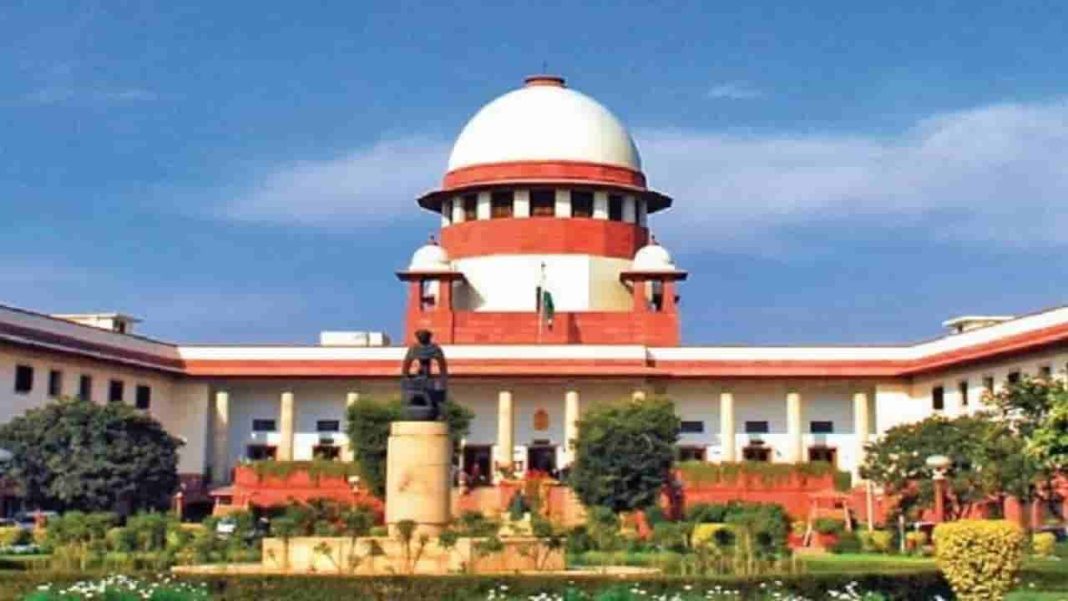The Supreme Court has directed the government of Manipur to prepare a status report within two weeks on action taken against those either stocking or using arms illegally as well as to formulate a plan for recovering the ammunition stolen from the police and state armoury.
The Bench of Chief Justice of India D Y Chandrachud, Justice J.B. Pardiwala and Justice Manoj Misra, while hearing a batch of petitions regarding the ethnic clashes that broke out in the state, told the counsels appearing for the various tribes and accusing each other of looting weapons that this was a ‘sensitive’ issue, which must be looked into seriously, irrespective of which side was involved.
The Bench further directed the report to be shared only with the Court for the present after the state government submitted that making public the report on arms stolen may lead to panic.
Referring to its August 7 directions, the Apex Court directed Solicitor General Tushar Mehta, who appeared for the State of Manipur as well as the Central government, that the Bench should be apprised about the steps taken by the Manipur government regarding illegal arms irrespective of which side did it.
During the course of hearing, the Bench also recorded statements of the Manipur Chief Secretary, who submitted an affidavit stating that there was no shortage of food items, medicines or other essential supplies in the relief camps and that the state had been taking note of all concerns.
On August 7, the Bench of Chief Justice of India D.Y. Chandrachud, Justice J.B. Pardiwala and Justice Manoj Misra had constituted a committee of three former High Court women judges to probe the incidents of ethnic violence, which continued in the state of Manipur for about three months, leading to the death of more than 140 people and injuries to many.
The Bench said that the formation of the committee was necessary to ‘restore’ people’s faith in the rule of law and to build a ‘sense of confidence’ among them.
Headed by Justice Gita Mittal (former Chief Justice of Jammu and Kashmir High Court), the Committee consisted of Justice Shalini Phansalar Joshi (former Bombay High Court judge) and Justice Asha Menon (former Delhi High Court judge).
The Apex Court noted that the broad based committee would look at the ‘diverse aspects’ on ‘humanitarian’ grounds such as relief, remedial and rehabilitation measures, along with restoration of homes and places of worship.
Adding ‘one more layer of security,’ the Bench appointed former Maharashtra DGP and Mumbai Police Commissioner Dattatray Padsalgikar IPS, who would oversee the CBI investigation and report back to the Court.
The Central Bureau of Investigation (CBI) apprised the Apex Court that it would probe 11 FIRs relating to serious crimes against women, including the naked parading of women and their sexual assault. The Bench then directed the national agency to include 5-6 Deputy SP or SP rank officers from different states in the CBI probe team for investigating the 11 cases of rape and sexual assault cases.
The government of Manipur said that it would hand over to CBI all cases related to crimes against women during ethnic clashes, as and when they came to light.
The government further said that it would constitute six SITs comprising senior police officials for six districts to probe the offences, which took place during the ethnic clashes, apart from a women only police officers’ team for crimes against women during the period.
The state government informed the Apex Court that it would constitute 42 SITs to look after cases which were not transferred to CBI. The Bench ordered that the 42 state SITs would be supervised by six DIG rank officers drawn from outside the state and would include at least one inspector from other State Police forces.
The top court of the country said that a formal order regarding the above directions would be uploaded by evening.
The Apex Court took in view the state government’s willingness to constitute 42 SITs to look after the cases which were not transferred to CBI.
It ordered that the 42 state SITs would be supervised by six DIG rank officers drawn from outside Manipur and would include at least one inspector from other State Police forces.
The Bench said that a formal order regarding the above directions would be uploaded by the end of the day.
The Apex Court passed the slew of directions on a batch of petitions seeking probe into the ethnic violence, which rocked the state of Manipur.


